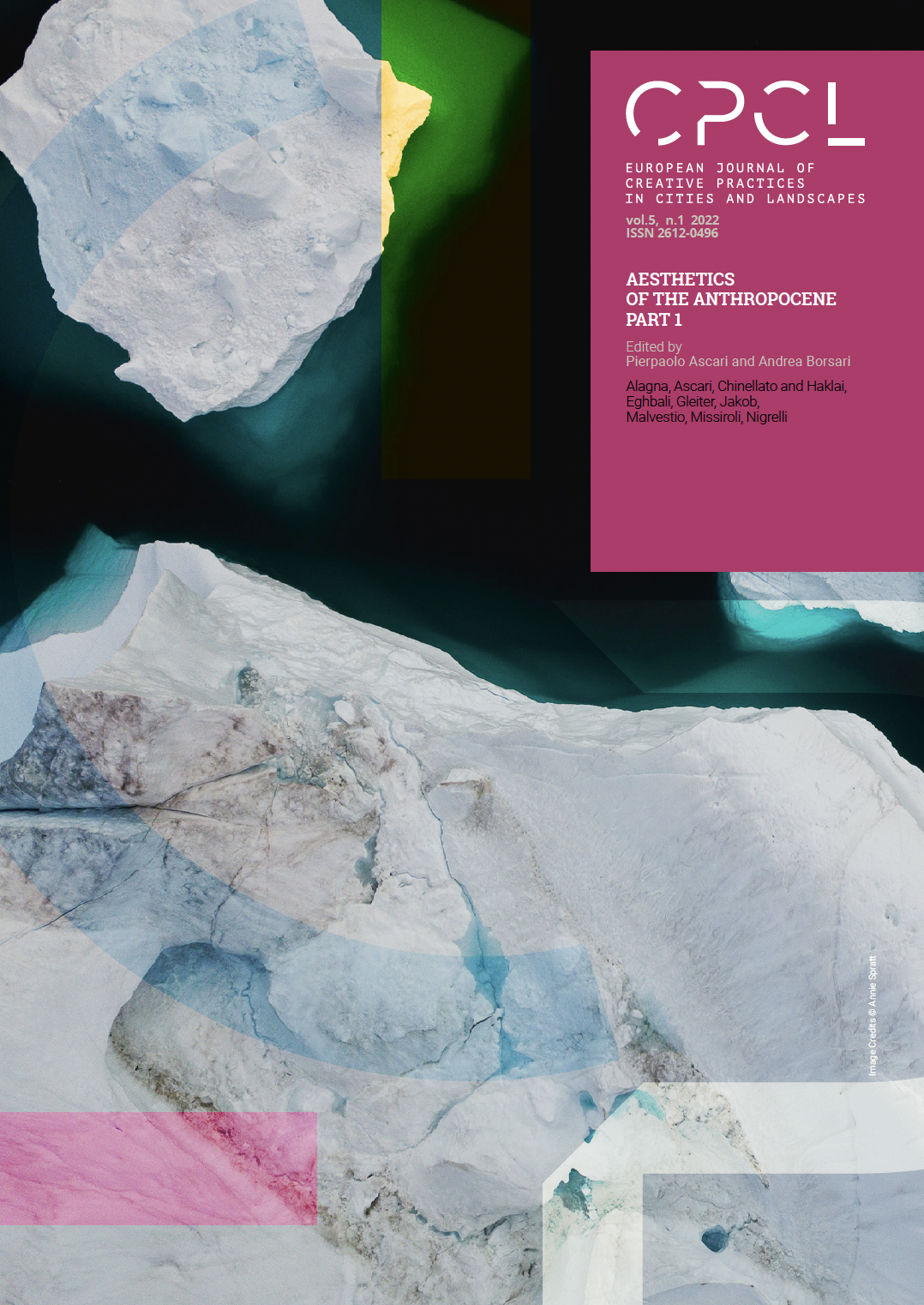Inhabiting the Anthropocene. Aesthetics of Everyday Life in Times of Crisis
DOI:
https://doi.org/10.6092/issn.2612-0496/14803Keywords:
Climate change, covid-19 pandemic, hyperobject, habit, material objectsAbstract
Reconciling the seemingly incompatible concepts of the Anthropocene and the everyday, this paper argues and demonstrates that (1) despite the disconcerting effects of its truly planetary scale, the Anthropocene is not absent or invisible in the realm of everyday life; (2) the everyday is not simply a neutral background solely meant for times of stability, but it is in fact a dynamic system that responds to various scales of change and absorbs the new and the unfamiliar into the familiar. Moreover, the paper also shows that the ways in which change is lived and navigated on an everyday scale, in times of the covid-19 pandemic and climate change, are a unique field for aesthetic enquiry. Everyday material objects such as tote bags, water bottles, masks, and habits like working from home and second-hand wearing are discussed as examples of the everyday experience of relating to the Anthropocene and its crises.
References
Benjamin, Walter. “Paris, Capital of the Nineteenth Century,” in Reflections: Essays, Aphorisms, Autobiographical Writings, edited by Peter Demetz, translated by Edmund Jephcott. New York: Schocken Books, 1986.
---, “Toys and Play: Marginal Notes on a Monumental Work,” in Selected Writings Volume 2, Part 1, 1927-1930, edited by Michael W. Jennings, Howard Eiland, and Gary Smith, translated by Rodney Livingstone et al. Cambridge & London: Harvard University Press, 1999.
Blanchot, Maurice. L'entretien infini. Paris: Gallimard, 1969.
Bohlin, Anna. “The Liveliness of Ordinary Objects: Living with Stuff in the Anthropocene,” in Deterritorializing the Future Heritage in, of and after the Anthropocene, edited by Rodney Harrison and Colin Sterling. London: Open Humanities Press, 2020.
Certeau, Michel de. L’invention du quotidien : 1. Arts de faire. Paris: Gallimard, 1990.
Clark, Timothy. Ecocriticism on the Edge: The Anthropocene As a Threshold Concept. London: Bloomsbury Publishing, 2015.
Dharmaraj, Selvakumar, Ashokkumar, Veeramuthu, Hariharan, Sneha, Manibharathi, Akila, Show, Pau Loke, Chong, Cheng Tung, and Ngamcharussrivichai, Chawalit. “The COVID-19 pandemic face mask waste: A blooming threat to the marine environment.” Chemosphere, 287, no. 4 (2022): 132411. https://doi.org/10.1016/j.chemosphere.2021.129601
Dupuy, Jean-Pierre. La Catastrophe ou la vie. Pensées par temps de pandémie. Paris: Éditions du Seuil, 2021.
---. Pour un catastrophisme éclairé : Quand l'impossible est certain. Paris: Éditions du Seuil, 2002.
Felski, Rita. “The Invention of Everyday Life.” New formations, 39 (1999): 13-31.
Hamilton, Clive. Defiant Earth: The Fate of Humans in the Anthropocene. Cambridge: Polity Press, 2017.
---. “The Anthropocene as Rupture.” The Anthropocene Review, 3, no. 2 (2016): 93–106. https://doi.org/10.1177/2053019616634741
Harman, Graham. Object-oriented ontology: A new theory of everything. London: Penguin UK, 2018.
Heller, Agnes. Everyday Life. Translated by G. L. Campbell. London: Routledge & Kegan Paul, 1984.
Heyd, Thomas . “Covid-19 and climate change in the times of the Anthropocene.” The Anthropocene Review, 8, no. 1 (2021): 21–36. https://doi.org/10.1177/2053019620961799
Horn, Eva. “Challenges for an Aesthetics of the Anthropocene,” in The Anthropocenic Turn: The Interplay between Disciplinary and Interdisciplinary Responses to a New Age, edited by Gabriele Dürbeck and Philip Hüpkes. New York & London: Routledge, 2020.
---. “Tipping Points: The Anthropocene and Covid-19,” in Pandemics, Politics, and Society: Critical Perspectives on the Covid-19 Crisis, edited by Gerard Delanty. Berlin & Boston: De Gruyter, 2021.
Kainulainen, Maggie. “Saying Climate Change.” symplokē, 21, no. 1-2 (2013): 109-123. muse.jhu.edu/article/532814.
Kelley, Colin P., Mohtadi, Shahrzad, Cane, Mark A., Seager, Richard, and Kushnir, Yochanan. “Climate Change in the Fertile Crescent and Implications of the Recent Syrian Drought.” Proceedings of the National Academy of Sciences 112, no. 11 (2015): 3241-46. https://doi.org/10.1073/pnas.1421533112
Latour, Bruno. “La crise sanitaire incite à se préparer à la mutation climatique.” Le Monde (26 March 2020), 23. https://www.lemonde.fr/idees/article/2020/03/25/la-crise-sanitaire-incite-a-se-preparer-a-la-mutation-climatique_6034312_3232.html
---. We Have Never Been Modern. Translated by Catherine Porter. Cambridge: Harvard University Press, 1993.
Merleau-Ponty, Maurice. Phenomenology of Perception. Translated by Colin Smith. New York & London: Routledge, 2002.
Morton, Timothy. Dark Ecology. New York: Columbia University Press, 2016.
---. Hyperobjects: Philosophy and Ecology after the End of the World. Minneapolis: University of Minnesota Press, 2013.
O'Callaghan-Gordo, Cristina and Antó, Josep M. “COVID-19: The disease of the Anthropocene.” Environmental Research, 187 (2020): 109683. https://doi.org/10.1016/j.envres.2020.109683
Swyngedouw, Erik. “Apocalypse Forever?” Theory, Culture & Society, 27, no. 2–3 (2010): 213–232. https://doi.org/10.1177/0263276409358728
Swyngedouw, Erik and Ernstson, Henrik. “Interrupting the Anthropo-obScene: Immuno-Biopolitics and Depoliticizing Ontologies in the Anthropocene.” Theory, Culture, and Society 35, no. 6 (2018): 3-30. https://doi.org/10.1177/0263276418757314
Teyssot, Georges. A Topology of Everyday Constellations. Cambridge & London: The MIT Press, 2013.
Williston, Byron. “The Sublime Anthropocene.” Environmental Philosophy, 13, no. 2 (2016): 155-174. https://www.jstor.org/stable/26169861
Wilson, Japhy and Swyngedouw, Erik. “Seeds of Dystopia: Post-Politics and the Return of the Political,” in The Post-Political and Its Discontents: Spaces of Depoliticisation, Spectres of Radical Politics, edited by Japhy Wilson and Erik Swyngedouw. Edinburgh: Edinburgh University Press, 2014.
Žižek, Slavoj. Pandemic!: COVID-19 Shakes the World. London & New York: OR Books, 2020.
Downloads
Published
How to Cite
Issue
Section
License
Copyright (c) 2022 Arshia Eghbali

This work is licensed under a Creative Commons Attribution 4.0 International License.




